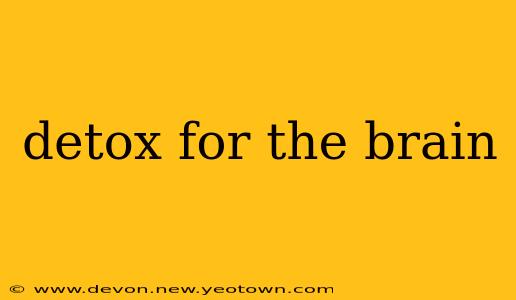We all crave that feeling of mental sharpness, that effortless flow of ideas, that unwavering focus. But modern life – with its constant barrage of information, stress, and unhealthy habits – can leave our brains feeling foggy, sluggish, and overwhelmed. It’s time for a brain detox! This isn't about some magic pill; it's about adopting a holistic approach to cleanse and revitalize your mind, improving cognitive function and overall well-being. Think of it as a spring cleaning for your most valuable asset – your brain.
What Does a Brain Detox Actually Mean?
A brain detox isn't about eliminating toxins in the literal sense (that's the job of your liver and kidneys). Instead, it's about minimizing the impact of stressors and unhealthy habits that negatively affect brain function. It's about consciously choosing activities and lifestyle changes that promote cognitive health and mental clarity. This includes addressing factors like poor sleep, excessive screen time, nutritional deficiencies, and chronic stress.
How to Detox Your Brain: Practical Strategies
Our journey to a sharper, clearer mind begins with small, manageable steps. Let's explore some key areas:
1. Prioritize Sleep: The Ultimate Brain Restorer
How much sleep do I need for optimal brain function? Most adults need 7-9 hours of quality sleep nightly. Sleep deprivation impairs cognitive function, impacting memory, concentration, and decision-making. Aim for a consistent sleep schedule, create a relaxing bedtime routine, and ensure your sleep environment is dark, quiet, and cool.
2. Digital Detox: Reclaim Your Focus
How can I reduce my screen time and improve my mental well-being? Excessive screen time exposes your brain to a constant stream of stimulation, leading to mental fatigue and decreased attention span. Schedule regular breaks from screens, create "screen-free" zones in your home, and prioritize face-to-face interactions. Consider using apps that track and limit your screen time.
3. Nourish Your Brain: The Power of Nutrition
What foods are good for brain health? A balanced diet rich in fruits, vegetables, whole grains, and healthy fats is crucial for optimal brain function. Focus on foods rich in antioxidants, omega-3 fatty acids, and B vitamins. Limit processed foods, sugar, and saturated fats, as these can negatively impact cognitive performance.
4. Manage Stress: Find Your Calm
What are some effective stress management techniques? Chronic stress releases cortisol, a hormone that can damage brain cells and impair cognitive function. Incorporate stress-reducing activities into your daily routine, such as meditation, yoga, deep breathing exercises, or spending time in nature. Learning to manage stress is vital for maintaining a healthy mind.
5. Boost Brainpower Through Exercise
How does exercise benefit my brain? Regular physical activity increases blood flow to the brain, delivering essential nutrients and oxygen. It also stimulates the production of brain-derived neurotrophic factor (BDNF), a protein that promotes the growth and survival of brain cells. Aim for at least 30 minutes of moderate-intensity exercise most days of the week.
6. Hydration is Key: Stay Well-Hydrated
How much water should I drink daily for optimal brain health? Dehydration can significantly impact cognitive function, leading to fatigue, difficulty concentrating, and impaired memory. Make sure to drink plenty of water throughout the day to keep your brain optimally hydrated.
The Long-Term Benefits of a Brain Detox
By consistently implementing these strategies, you'll not only experience improved cognitive function but also enhanced mood, reduced stress levels, and a greater sense of overall well-being. Remember, a brain detox is an ongoing process, not a quick fix. It's a commitment to nurturing your mind and prioritizing your mental health for a happier, healthier you.

